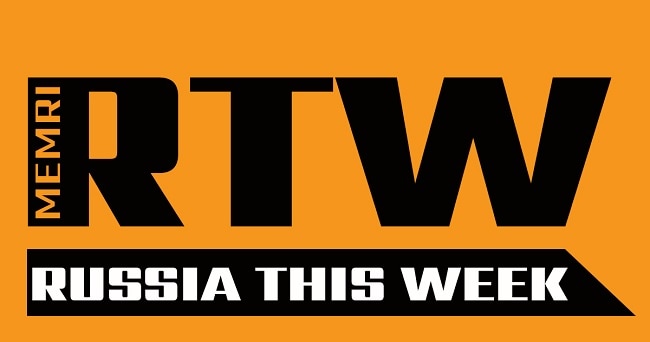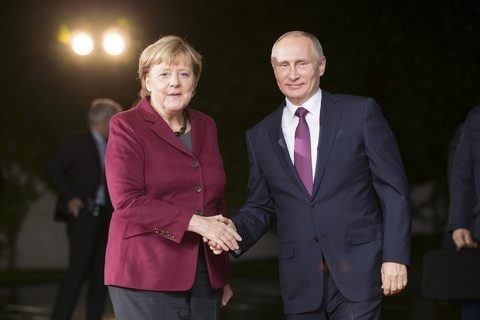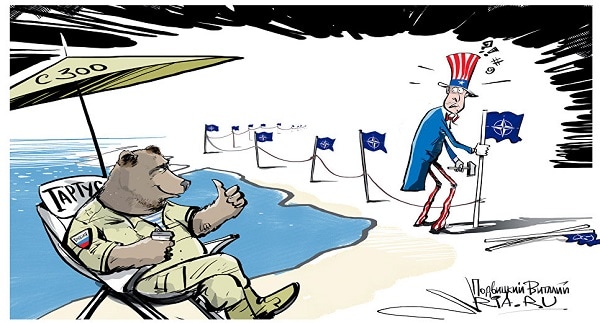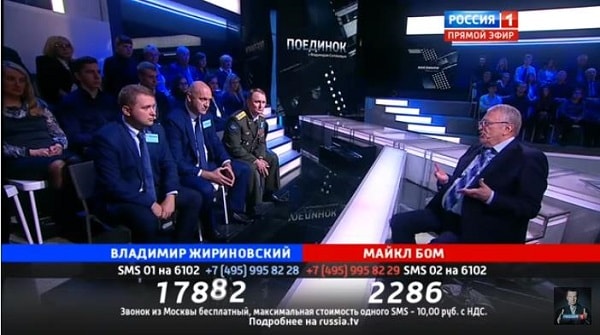Russia This Week is a weekly review by the MEMRI Russian Media Studies Project, covering the latest Russia-related news and analysis from media in Russia, the Caucasus, Central Asia, and Eastern Europe.

Putin dodges an EU Council sanctions bullet with a little help from Italy. While some Russian elite commentary calls for damping down the conflict, Vladimir Zhirinovsky threatens to drown the US by tilting the earth's axis.
Cartoon Of The Week

(Source: Vitaly Podvitsky, Vk.com/13studiya, October 12, 2016)
ISIS sucks from the teat of the US dollars.
Zakharova Dixit
Russian Foreign Ministry spokesperson Maria Zakharova is one of the most-quoted Russian officials. She is known for using colorful language when describing Russian foreign policy in her weekly press briefings. The following are Zakharova's quotes of the week:

(Source: Mid.ru, October 20)
"The fact that the US avoids engaging in normal cooperation in law enforcement is one more proof that its claims against Russia and its citizens are politically tinged."
(Mid.ru, October 20)
Quotes Of The Week:
Russia's Deputy Foreign Minister Sergey Ryabkov criticized the US' new calls for further sanctions on Moscow: " This resembles [renowned Russian scientist, Ivan] Pavlov's dog: the bell rings and the secretion of the gastric justice begins to churn. If a monkey is kept in a cage for long, you can teach her to press a lever to deliver the feed stuff... This is precisely the case: if something does not suit the United States in Russia's behavior, shouts about sanctions [are] to begin."
(Tass.com, October 17)
Ryabkov also said: "We will find some measures in our arsenals, which will be painful enough for the US. It will have to do first and foremost with American positioning in the world and with the American policy towards Russia and Europe in general... (The Americans) have bank accounts and property (in Russia), so our mirror measures may be quite painful."
(Ria.ru, October 19)

Sergey Ryabkov (Source: Rt.com)
Commenting on Russia-US relations, Senator Konstantin Kosachev said: "The direct war between Russia and the United States is the most terrifying scenario which should be avoided by all possible means. A conflict with the United States is definitely not part of the Russian Federation's plans."
(Tass.com, October 9)
Tweet Of The Week:
Senator and former chair of the International Affairs Committee of the State Duma, Aleksey Pushkov, wrote in his Twitter account: "Many Americans, who are 'disgusted' by Trump's sex-lexicon, risk the lives of their sons in the wars that the US will be involved in, should Clinton be elected".

(Twitter.com/Alexey_Pushkov, October 16)
In The News:
Merkel-Hollande-Putin Meeting
On October 19, Russian President Vladimir Putin met in Berlin with German chancellor Angela Merkel and French President Francois Hollande, to discuss the Syrian crisis. The Russian delegation at the talks included Presidential aide Yuri Ushakov and Foreign Minister Sergey Lavrov. Before the meeting, Putin had a telephone conversation with Syrian President Bashar al-Assad. The Berlin talks also discussed the situation in Ukraine in the Normandy group (Russia, Germany, France and Ukraine) framework.
(Kremlin.ru, October 20)

Talks with Putin, Merkel and Hollande. (Source: Kremlin.ru)
Commenting on the Normandy group meeting, Igor Yakovenko, columnist for the Everyday Journal, wrote that Putin's main goal was to demonstrate that Europe "they cannot do anything without Russia". According to the Russian columnist, Putin has also vividly demonstrated that he does not attach any significance to targeted European sanctions against certain official Russian representatives. Take for example Vladislav Surkov. Putin's aide, advisor and a senior figure in the presidential administration, who allegedly masterminded the Russian actions in Crimea and East Ukraine, sat at the same table with European leaders although he is personally under European sanctions, and is generally denied entry to Europe. Yakovenko wrote that the main message which Putin tried to project both domestically and abroad is that Russia is not isolated in the international field while Putin's personal role is underlined, while constant discussions with the Europeans actually just serve this goal. "What isolation are you talking about if Merkel - at the media's requests - shook hands with Putin three times in a row?", asked Yakovenko in his caustic description of Russian attempts to burnish their image.
(Ej.ru, October 21)

Merkel shaking hands with Putin. (Source: Ej.ru)
Gazeta.ru published an editorial, titled "A Very Cold Peace", commenting on the Normandy Four meeting. According to Gazeta.ru, the only positive outcome of the meeting was the very fact that such a meeting actually took place. Last August, Putin had publicly scoffed at the necessity for the Normandy Four format, calling it "senseless". The editorial then stated: "Russia has no money for lengthy and massive confrontation with the world. But at the same time the confrontation and the practice of military-civic national mobilization is merely the only way to maintain the authorities' ratings and their ability to govern the country amidst permanent crisis." The editorial continues: "The responsibility of the nuclear countries for the fates of the world remains very high. For this reason even meetings with no results regarding Ukraine or Syria, or Russian-American-German-French relations are critically important... Even fruitless negotiations are undoubtedly better than a bloody global war."
(Gazeta.ru, October 19)
Originally, Putin was to have met Hollande in Paris. However, Putin cancelled the trip, after Hollande said that Russia could be charged with war crimes for its bombardment of Aleppo. In Paris, Putin was expected to participate to the opening of the Russian Orthodox Spiritual and Cultural Center near the Eiffel Tower.

Russia's Orthodox Spiritual and Cultural Center near the Eiffel Tower (Source: Lefigaro.fr)
It is worth noting that on October 8, Russia voted against the UN Security Council draft resolution on Syria, proposed by France. On the other hand, the Russian draft resolution failed to receive a minimum number of votes at the UNSC. Prior to the vote, Russia's Permanent Ambassador to the UN said: "Today we are participating in one of the most bizarre scenes in the history of the UN Security Council. We will vote on the two draft Council resolutions, and we are all well aware that neither of them will be accepted."
SUPPORT OUR WORK

(Russiaun.ru, October 7)
Commenting on the draft resolution, proposed by France, the Russian Foreign Ministry wrote: "The text of the document, which was obviously drawn up with Washington's encouragement directly after the United States refused to observe the Russian-US agreements on the Syrian settlement, flagrantly misrepresented the actual state of affairs and had a politically-charged and unbalanced character. The French-proposed document indiscriminately laid the blame for the escalation of tensions in the Syrian Arab Republic solely on the country's authorities and plainly attempted, through a ban on military flights over the city of Aleppo, to afford protection to Jabhat al-Nusra terrorists and the militants that have merged with it, despite the UN member states' obligation to fight the terrorist threat with all available means. The draft resolution completely obscured the fact that the humanitarian crisis in Aleppo was provoked deliberately, when in August and September the militants refused to provide access to humanitarian convoys, threatening to open fire on them. At the same time, the document ignored the need to promptly initiate an intra-Syrian political process, which is being sabotaged by the same Syrian opposition members who are supported and covered by the West in every possible way..."
(Mid.ru, October 8)
During an interview with French TV channel TF1, Putin explained why he cancelled his trip to Paris. Putin said: "We had planned to hold an official opening ceremony for the newly built Russian religious and cultural center in Paris. From the looks of things though, this is not the best moment for official meetings, given the lack of mutual understanding, to put it mildly, that we have over events in Syria, particularly the situation in Aleppo. But we are always open, of course, to any consultations and dialogue on this matter." He then explained that some of the responsibility for what is happening in the region in Syria lies especially with the US and its allies. Putin said: "Remember how everyone rushed to support the Arab Spring? Where is that optimism now? How did it all end? Remember what Libya or Iraq looked like before these countries and their organizations were destroyed as states by our Western partners' forces? Certainly, these were not examples of democracies as we understand the word today, and there probably was a need and possibility to influence these societies' organization, the state organization, and the nature of these regimes. But whatever the case, these states showed no signs of terrorism. They were not a threat for Paris, for the Cote d'Azur, for Belgium, for Russia, or for the United States...Our goal is to prevent the same from happening in Syria."
(Kremlin.ru, October 12)
Earlier, at the eighth Russia Calling! Investment Forum organized by VTB Capital, Putin said:
"It is not our partners who should be offended by our veto of the French resolution. We should be offended...Our respected friend and colleague, the French foreign minister [Jean-Marc Ayrault] came to Moscow and presented the French resolution. To which our foreign minister [Lavrov] said: 'We will not vote against it if you take our amendments and considerations on this issue into account. We are deeply involved in this crisis, in these problems; we know the details.' To which his French counterpart said: 'Yes, of course, nor do we want to be slapped with this kind of veto.' Our representative to the UN in New York was told the same. Lavrov laid out the Russian position and there is nothing excessive in it.
"I can tell you frankly what this was all about. The French resolution blamed the situation entirely on the Syrian authorities and said nothing about the opposition - in this case I am not talking about terrorists - the opposition that should also bear some responsibility, and some tasks should also be put before it. That is my first point.
"Second, we stated that we were willing to endorse the initiative of the UN Secretary-General's special envoy Mr. de Mistura regarding the militants' withdrawal from Aleppo. The French side took a positive view of that. We expected further joint constructive work both with France and with other Security Council members.
"So what happened next? The French foreign minister left Moscow for Washington and the following day he and Mr Kerry accused Russia of every sin imaginable; no one talked to us and discussed nothing with us, and they threw this resolution at the Security Council, clearly expecting our veto. Why?
"Not for the resolution to be adopted - they submitted it knowing our position and without even discussing our proposals with us - but for it to be vetoed. Why? To escalate the situation and unleash anti-Russian hysteria in the controlled media, in fact deceiving their people and their citizens. I am referring now not only to France but also to many European countries and the United States. To all appearances, this is especially valuable in the context of an election campaign.
"I do not know whether or not this meets the interests of European countries, but serving the foreign policy interests and maybe even domestic policy interests of its allies, in this case the United States - is that the role that should be played by serious politics and serious countries that claim an independent foreign policy and the status of great powers? I am not sure about that... The airstrike on the humanitarian convoy. If anyone would know who attacked that convoy, it's us. It was one of the terrorist organizations. And we know that the Americans know that, but prefer to take a different position and blame everything on Russia. This will do nothing to help. This is just what I spoke about recently. This kind of behavior in the international arena is called pressure and blackmail. However, this has never worked and will never work with Russia."
(Kremlin.ru, October 12)
According to Alexey Venedictov, editor in chief of Echo Moscow explained the conflicting agendas of Hollande and Putin. Hollande intended to signal that West is isolating Russia, i.e. the West is eager to talk with the Kremlin on practical issues and most notably Syria, but it is unprepared to promote an atmosphere of sound bilateral relations by attending Russian exhibitions at the Pompidou Center. According to Venedictov, Putin's goal during the visit was just the opposite namely to demonstrate publicly, that tensions with the West notwithstanding, relations with France are unfolding, rather than to be cornered into the scenario envisaged by Hollande of holding discussions exclusively on Syria.
(Echo.msk.ru, October 11)
EU Sanctions
If Putin could afford to affront Hollande he could not avoid talks with German Chancellor Merkel on Syria. Merkel in "very tough talks" condemned the air raids carried out by Russia and the Syrian government on Aleppo as "inhumane and cruel" and meeting Germany's definition of war crimes. Hollande also participated in the Berlin meeting, Putin's first visit to the city since his 2014 annexation of Crimea.
While Ukraine topped the list of issues discussed, Putin was not able to avoid the topic of Syria Hollande told Putin bluntly that "what is happening in Aleppo is a war crime, one of the first demands is that the bombardments by the regime and its [Russian] backers must end".
Both Merkel and Hollande warned that they could not exclude imposing sanctions on Russia, hours ahead of the October 20-21 EU Council summit that was to discuss Russia's role in Syria..
"Everything that can constitute a threat can be useful," Hollande said at a press conference, while Merkel added that "we cannot remove this option".Putin sought to assuage Merkel and Hollande by stating his willingness to prolong a unilateral ceasefire in Aleppo "as far as possible".
(Thelocal.de, October 20)
In any event, although Merkel is a sanctions hawk, she was stymied by her SPD coalition partners, who are nostalgic for the détente policy towards Russia (emphasized by former SPD chancellors Willy Brandt and Helmut Schroeder) and is preparing to use its conciliatory approach towards Russian in next year's general election campaign.
(Spiegel.de/international, October 18).
At the EU Council meeting the move for tougher sanctions favored by the majority of EU states was blocked by Italy, backed also by Greece and Cyprus. Italy's Prime Minister Matteo Renzi said that stiffer sanctions were not useful in solving diplomatic disputes. As the EU requires unanimity on such issues, the sanctions requested by Merkel were removed from the final text's conclusions - a victory for the soft approach favored by Renzi.
(Ilsole24ore.com, October 20; Corriere.it, October 21)
Ceasefire in Aleppo
On October 18, Russia announced a humanitarian cease-fire around Aleppo. The fighting resumed on October 23.
Live Webcast In The Area Of Humanitarian Corridors In Aleppo
The official website of the Russian Defense Ministry launched the webcast of unmanned aerial vehicles and surveillance cameras in the area of humanitarian corridors in Aleppo.

See the live webcast
Russia-Belgium Relations
On October, 19 the Russian Defense Ministry and the Ministry of Foreign Affairs accused the Royal Belgian Air Force of bombing the suburbs of Aleppo, resulting in civilian deaths. Zakharova commented: "We expect the US-led coalition and Belgium, in particular, as well as all the international institutions, who have been so deeply concerned about the Russian Aerospace Force air raids, especially about alleged strikes on civilian targets, to provide an adequate response... We believe that this fact cannot be ignored... If no one comments on it, then we will conclude that the real concern is not about the plight of Aleppo's civilians... This media buzz is aimed at protecting Jabhat al-Nusra and preventing the Russian Aerospace Forces from eliminating the terrorist groups in Aleppo."
(Tass.com, October 19)
The chairman of the Duma's Eurasian Integration Committee, Leonid Kalashnikov, said: "NATO members, Belgium in this case, are used to easily violating international laws... This is a clear provocation and an intervention by Belgium."
(Tass.com, October 19)
On October 21, the Belgian Ambassador to Russia Alex Van Meuwen was summoned to appear at the Russian Foreign Ministry. In a statement, Russia's MFA wrote: "First Deputy Foreign Minister Vladimir Titov told the [Belgian] Ambassador that the Foreign Ministry is perplexed at Belgium's persistent denial of the fact that on October 18... The Belgian diplomat was provided with proof of Belgium's involvement in the air strike on the village of Hassajek. It was said that detailed data on the technical parameters of the flights by two F-16 aircraft were also handed over by the Russian Defense Ministry to the Belgian defense attaché in Moscow."
(Mid.ru, October 21)
Russian Military Naval Base In Tartus
The Interfax news agency quoted an unidentified source in the Russian parliament, saying that Russian military naval base in Tartus (Syria) will be present there for 49 years according to an agreement with the Syrian government.
(Interfax.ru, October 17)
On October 10, Russia also announced that it's going to create a permanent military naval base in Tartus, Syria, (instead of a "technical -supply point"). Senator Igor Morozov, a member of the Federation Council's International Affairs Committee, said :"By doing so [i.e. establishing a permanent naval military base] Russia will increase its military potential not only in Syria, but also all over the Middle East and the Mediterranean region".
(Ria.ru, October 11)

Vitali Podovizki, Ria.ru, October 10, 2016
On the bear's chair: Tartus. On the umbrella: S-300.
According to Igor Korotchenko, the editor in chief of National Defense magazine: "Taking into account the increased missile potential of our vessels and submarines, the permanent base in Tartus will allow us to control not only the Middle East but also the whole Mediterranean. I think it will be the right move in order to neutralize the growing military potential of NATO, including its naval components."
(Ria.ru, October 10)
Pantsir Air Defense System
Russia is to transfer Pantsir close range air-defense systems to Syrian government forces. The contract to provide the systems was signed in 2008, but was not fulfilled due to Syria's inability to make payment. As for now, Russia has supplied at least 10 additional systems without immediate payment. In addition, Russia will supply radars and command positions which will enable the systems to operate jointly. Andrey Sushenzov, program director of Valdai club, said: "If a Syrian Pantsir intercepts an American jet, we will find ourselves in a very complicated political situation, since we will be held responsible and this will further exacerbate the US-Russian confrontation. So, at this time [Russia] is doing everything in order to make the Pentagon refrain from striking."
(Izvestia.ru, October 11)
Syria Recognizes Crimea As Part Of The Russian Federation
Syria recognized Crimea as an "integral part of the Russian Federation". The chairwoman of the Syrian parliament Hadiya Abbas, said that Syria recognized Crimea as an integral part of Russia, stressing that Syrian -Russian relations have a strategic perspective.
(Ria.ru, October 19)
News In Brief:
- On October 21, Deputy Foreign Minister Mikhail Bogdanov's met with the Syrian Ambassador to Russia Riyad Haddad (Mid.ru, Oct. 21)
- On October 21, Bogdanov met with the former Prime Minister of Lebanon Najib Mikat. (Mid.ru, Oct. 21)
- On October 21, the Minister of Foreign Affairs of the Republic of Guatemala Carlos Raul Morales visited Russia. (Mi.ru, Oct. 21)
- On October 21, Bogdanov met with Cameroonian Trade Minister Luc Magloire Mbarga Atangana (Mid.ru, Oct. 21)
- On October 24-28, Beirut will host the First Russian Film Festival in Lebanon titled "Five Years in Five Days." (Mid.ru, Oct. 20)
Strange But True

On October 7, the Chairman of the LDPR party Vladimir Zhirinovsky was one of the guests of the TV show "Poedinok" ("Duel ") on Russia 1 TV channel.
Zhirinovsky: If the Americans assume that they will be the first to start [the war], and again there will be bombs falling on our heads - it's not going to happen. The end will come prior to an attack - June 20, June 22 won't happen again. [referring to the start of Nazi Germany's Operation Barbarossa against Russia on June 22, 1941].
Romanian journalist: So, as far as I understand you support the idea of preemptive nuclear war?
Zhirinovsky: And what do you want? That we will be exterminated? I tell you - no one will dare to attack us, because all those who want to attack us will be neutralized. We warn you very frankly. Those who plan to attack Russia will stay in their beds. Have you heard about the new weapon? You go to bed, and you don't awake. This is a magnetic weapon. There will be such a pressure in the US that everything will stay down - buildings, everything, and no nuclear ashes, no noise or radiation... There will be nothing left in Romania, and Poland and Czech Republic - if you set up a missile defense there. In the Baltics - if the American tanks approach our borders - they won't be able to retreat. They will be burnt together with their crews.... America prepares a war. American leaders are dangerous. Those newcomers, negro Obama and this girl, who is going to take his place, Clinton - they have not been there during WWII, that's why they are dangerous. They want to experience it... we need to take certain measures. Well, it's possible to conduct an operation on a small fraction of American territory, this magnetic weapon might be demonstrated in this or another state. Do you remember that there was a tsunami? Thailand, Indonesia - two hundred thousand dead. This was done by the Americans. It was codenamed "Wash up". We will have to use the most powerful thing- the Earth's axis. It's possible to influence it - a couple of degrees to the left, and the entire American continent drowns. We can do that - you [the Americans] cannot. So, if you drag us there - it's possible... We may move the axis a bit, and you'll look in your lenses: one moment there was [once] the US; in another moment - there is no more United States.
See video on YouTube




